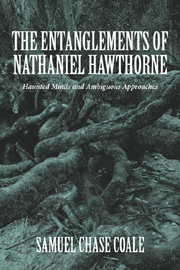Book contents
- Frontmatter
- Contents
- Acknowledgments
- List of Abbreviations
- Introduction: Entanglements
- 1 The Legacy of The Scarlet Letter: Hawthorne in Contemporary Culture
- 2 Hawthorne as Nineteenth-Century Morbid Genius
- 3 Biographical and Critical Veils in the Nineteenth Century
- 4 Biographical Visions of the Twentieth Century
- 5 Entangled Polarities: The New Criticism
- 6 Doubting Dualisms: The Strategies of Hawthorne's Romance
- 7 Ideological Contexts: Deconstruction, Feminism, the New Historicism, Race, and Entanglement
- Works Cited
- Index
6 - Doubting Dualisms: The Strategies of Hawthorne's Romance
Published online by Cambridge University Press: 12 September 2012
- Frontmatter
- Contents
- Acknowledgments
- List of Abbreviations
- Introduction: Entanglements
- 1 The Legacy of The Scarlet Letter: Hawthorne in Contemporary Culture
- 2 Hawthorne as Nineteenth-Century Morbid Genius
- 3 Biographical and Critical Veils in the Nineteenth Century
- 4 Biographical Visions of the Twentieth Century
- 5 Entangled Polarities: The New Criticism
- 6 Doubting Dualisms: The Strategies of Hawthorne's Romance
- 7 Ideological Contexts: Deconstruction, Feminism, the New Historicism, Race, and Entanglement
- Works Cited
- Index
Summary
We begin to see in the literary criticism of the late 1960s and 1970s the “linguistic turn” and the deconstructionist perspective that originated at that time in the criticism of French philosophers and social critics such as Jacques Derrida, Roland Barthes, Michel Foucault, and Jean-Francois Lyotard and was explored by critics such as Paul de Man and J. Hillis Miller. While Derrida dealt explicitly with language and texts and Lyotard with the demise of metanarraritives, those overarching cultural myths of progress and value, Barthes dismantled and deconstructed the idea that an author's intentions could be discovered in a text (in proclaiming the death of the author), Foucault undermined hierarchical concepts of power (he saw power dispersed everywhere and in everyone, even in discourse itself), while de Man and Miller refined Derrida's original ideas. Each of these critics, whom we can label “deconstructionist” in opposition to the more traditional critics with their New Critical perspectives and backgrounds, attacked conventional concepts such as language's transparency and connection to the world at large, the author's individual intentions in regard to her text, and power as a simple hierarchy to which individuals are subject as citizens to states.
From the deconstructionist point of view, everything becomes a text, a discourse. All the symbolic, psychological, and mythic patterns that the New Critics championed are the creation of language, which in many ways becomes, in Fredric Jameson's phrase, its own prison house, its own code that is separated from the world at large. All dualisms and polarities break down and collapse inward upon themselves as if into a black hole. Representation becomes suspect; words feed only upon themselves in their sense of difference and deferral and do not lead the reader to any world beyond the text. Everything becomes a signifier of something else, never a signified. All is metonymy, parts of an imagined but forever deferred nonexistent whole. We can know only disruption, dispersion, and disconnection, however much language tries to convince us otherwise. Language speaks us rather than the other way around, and we are victims of such cultural codes and conventions as we become aware of such linguistic structures and patterns and how they operate within and around us. As we become more aware of such conventions, we recognize more clearly our own victimization in relation to them.
- Type
- Chapter
- Information
- The Entanglements of Nathaniel HawthorneHaunted Minds and Ambiguous Approaches, pp. 116 - 135Publisher: Boydell & BrewerPrint publication year: 2011



